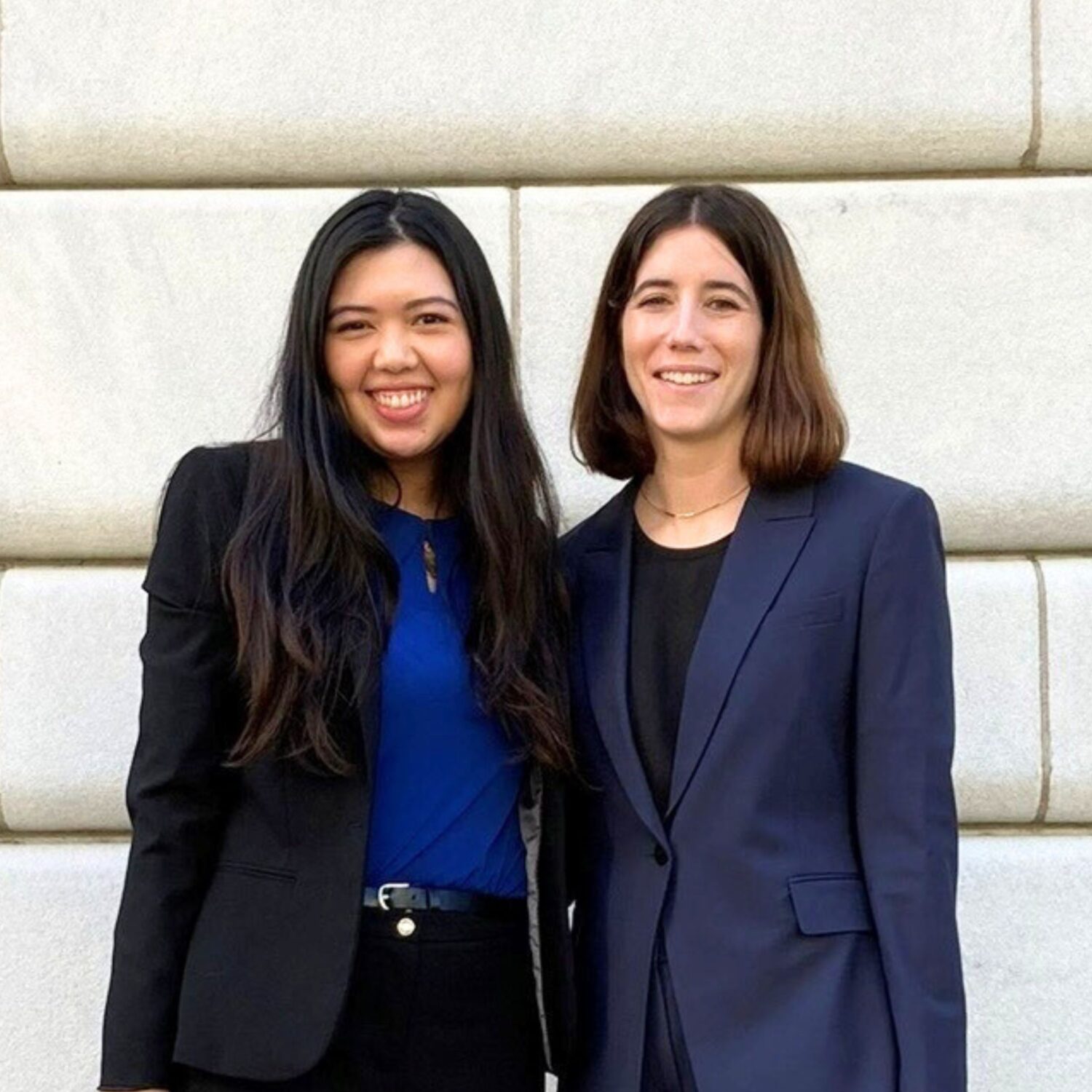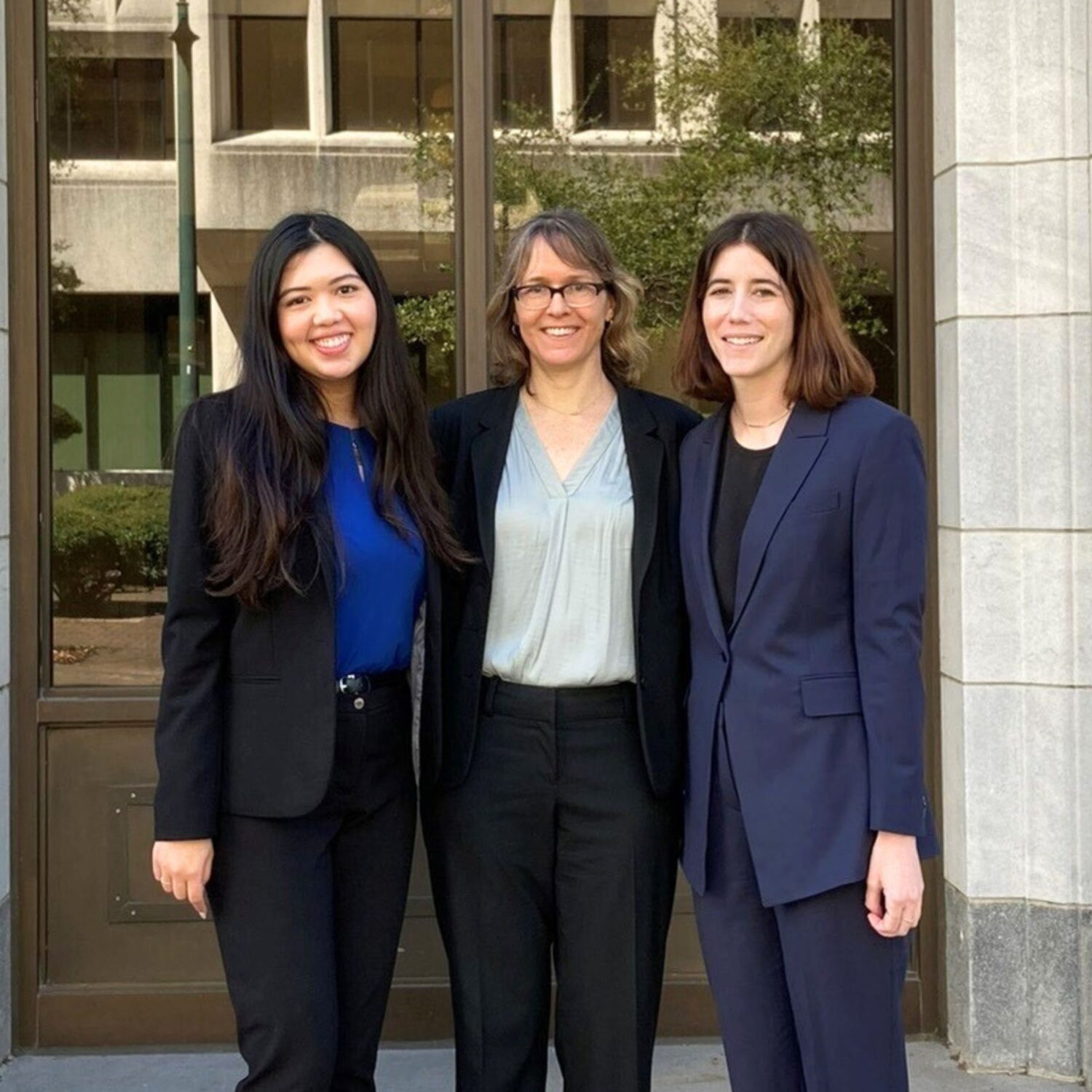On March 6, 2024, a pair of Texas Law students stepped out of a pleasant New Orleans morning and into the 5th U.S. Circuit Court of Appeals.

But they weren’t visiting spectators to the legal proceedings taking place inside.
Instead, Lisette Chan ’24 and Annie Fogel ’24 were at the court to argue L.N. v. Garland, challenging a deportation ruling on behalf of a woman from Angola. The client, who sought asylum and related protections in the U.S., maintained she had been a victim of three incidents of persecution after her father and other family members, who had vocally opposed corruption in the Angolan government, had been murdered.
L.N. v. Garland was a complex case involving multiple motions and appeals. Litigation began in 2018 and stretched on for many semesters in both immigration and federal court, with Chan and Fogel handling the case for two semesters as advanced students in Texas Law’s Immigration Clinic.
Their efforts were especially notable as the 5th Circuit acknowledges it’s exceedingly rare for law students to argue before the court.
Building the Argument
Immigration Clinic Co-Director and Professor Elissa Steglich advised the team, with Chan and Fogel involved in every aspect of building the argument before the 5th Circuit. Since it was an appeal, after an immigration judge denied the client’s application for asylum and agency appeals were exhausted, their first task was to become extremely familiar with the record. They pored through client and expert testimony, country conditions reports, and evidence presented to the Immigration Court, as well as arguments made before the court and the Board of Immigration Appeals, the nation’s highest administrative body for interpreting and applying immigration laws. They also studied arguments made in the case to the 5th Circuit in briefing before their involvement.

They next conducted legal research to see if more recent circuit precedents could impact the case, or if other circuit courts had heard similar arguments.
“We not only read every case we cited in our briefing but the additional cases the government cited,” Fogel says. “We reviewed all new and possibly relevant case law.”
Once they knew which judges would hear the argument, Chan and Fogel reviewed their cases to understand how they view issues, and they listened to oral arguments the judges had heard to become familiar with their questions and style.
The students practiced oral advocacy in three rigorous moot court sessions. Panels of Texas Law alumni and faculty experts in immigration law—including a former clerk for a 5th Circuit judge and other panelists who had argued before the 5th Circuit—offered feedback on the most persuasive arguments and presentation. Alumni panelists included Erica Schommer ’01, clinical professor and director of the Immigration and Human Rights Clinic at St. Mary’s School of Law in San Antonio; Leah Rodriguez ’19 and Anna Roberson ’20, staff attorneys at Texas RioGrande Legal Aid in Austin; Kara Blomquist ’19, immigration staff attorney at TRLA; Jonathan Levy ’13, senior staff attorney at immigration legal services firm American Gateways in Austin; and Maria Jose Vallejo LL.M. ’18, special project director at TRLA. Chan and Fogel also consulted with Supreme Court Clinic Co-Director Lisa Eskow.
Preparation was intense up to the last minute: Chan and Fogel spent their plane ride to New Orleans for the hearing flipping through case flashcards they had made.
Chan ensured all their legal analysis and records were complete and organized for Fogel, who memorized the case to present oral arguments before the panel.
High Stakes
The case was an example of what Immigration Clinic students undertake. “The stakes are high. We don’t shy away from the complicated cases—that’s where we can have an impact, ” Steglich says. “Our students offer really significant time and energy to invest in cases.”
At the 5th Circuit, the clinic sought a review of the BIA’s final order. While the court ordered that the ruling stand, Steglich says the students presented the strongest possible case.
“Obviously we would have loved to have won,” Chan says. “I know that we did the absolute best we could have for the client. We were prepared and it showed. The concerns that we raised were heard by the panel and that was validating. ”
Fogel says presenting the team’s arguments before the panel reaffirmed her passion for oral advocacy.
“It was an amazing experience,” says Fogel, with her team “able to respond to the judges’ questions in real time, stress our arguments, and have an opportunity for rebuttal.”
Community Need
Launched by Professor Barbara Hines 25 years ago and now led by Steglich and fellow Co-Director and Professor Denise Gilman, the Immigration Clinic’s primarily focus is on detention and deportation defense and asylum cases. With 10 to 14 new clinic students enrolled each semester—as well as two to six advanced students who return after completing at least one semester—the clinic offers hands-on experience. Students take on the primary responsibility and decision-making authority for their cases, under the mentorship of the clinic directors. They attend a weekly class, work in pairs on a case assignment, and meet with a case supervisor.
Students assist individuals who have been detained in Central Texas or are community members facing deportation. Past cases have involved family separation and migrant protection.
For some students, the clinic experience is especially personal. This was true for Chan. She says her Mexican mother faced distinct barriers to immigration that her father, who came from Hong Kong, did not. Chan, who recently joined Akin, Gump, Strauss, Hauer & Feld LLP in Houston as an associate in corporate and finance, has already logged pro bono hours on immigration cases.
“The Immigration Clinic and this experience made me more sure that this is something I want to continue doing, even if it’s not my full-time job —especially for asylum seekers and refugees,” Chan says. “They are most in need but have the least resources.”
Support from alumni and experts across the school made presenting a strong case possible, says Fogel, who now clerks at a circuit court.
“I felt the pressure and the stakes of it, but I also felt really well supported ,” she says. “We had a great network and resources to make sure that we were offering the best advocacy we could.”
